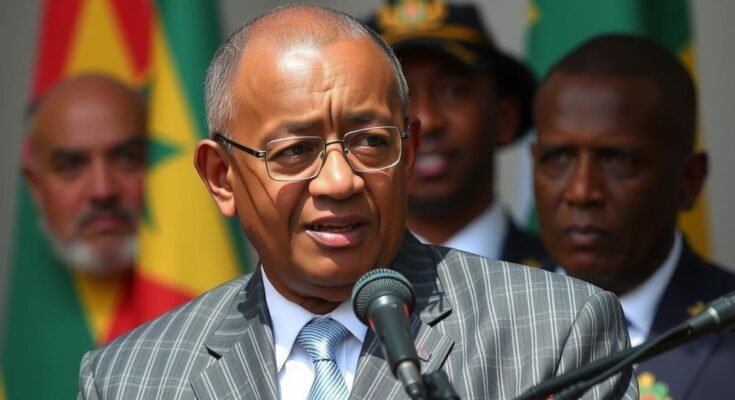Daniel Chapo was inaugurated as Mozambique’s president amid unrest and claims of electoral fraud. Opposition leader Venancio Mondlane alleges election rigging and has vowed to protest daily. The political situation remains tense, requiring Chapo to navigate through opposition demands while ensuring public welfare.
On Wednesday, Daniel Chapo was inaugurated as Mozambique’s new president in a solemn ceremony held in Maputo, amid heightened security and following a period of severe unrest post-election. Chapo’s ascension marks the continuation of the Frelimo party’s dominance in Mozambique, which has been in power for five decades. Opposition candidate Venancio Mondlane has contested the legitimacy of the elections, claiming they were manipulated, leading to widespread protests and violence that resulted in over 300 fatalities according to local NGOs.
Addressing the audience, Chapo committed himself to enhancing national unity, protecting human rights, and promoting democratic values. However, Mondlane has vowed to disrupt Chapo’s government through continuous protests, declaring, “We will protest every single day. If it means paralysing the country for the entire term, we will paralyse it for the entire term,” indicating a determination to challenge the ruling authority.
International observers have criticized the elections for irregularities, with the European Union specifically noting unjustifiable modifications to the election results. The absence of key foreign leaders at the inauguration has been interpreted as a lack of support for Chapo’s presidency. While security forces heavily policed Maputo during the ceremony, reports of violence persisted in regions such as Inhambane and Zambezia, with tragic consequences for both protesters and law enforcement.
Analysts have posited that Chapo may alleviate tensions by integrating opposition figures into his cabinet or entering into dialogues, a sentiment echoed by Mondlane, who expressed his willingness to negotiate despite his exclusion from initial discussions. The upcoming days will be critical in determining the stability of Chapo’s administration as the nation grapples with deep-seated political strife and public dissent.
The political landscape in Mozambique has been characterized by a lengthy tenure of the Frelimo party since independence in 1975. Recent elections held on October 9 raised significant controversy, as opposition claims were made regarding electoral fraud that favored the ruling party. Protests erupted nationwide, leading to violent confrontations and substantial loss of life, evidencing the discontent among opposition supporters.
The inauguration of President Daniel Chapo comes at a precarious time for Mozambique, marked by allegations of electoral misconduct and widespread civil unrest. The actions taken by Chapo in the coming weeks, including his approach to opposition leaders and potential reforms, will be pivotal in shaping the future political climate and ensuring national stability. The presence of dissent underscores the challenges he faces in maintaining governance amid a divided electorate.
Original Source: www.france24.com




